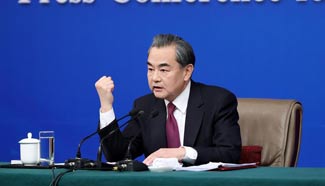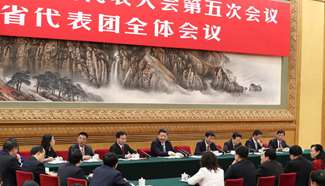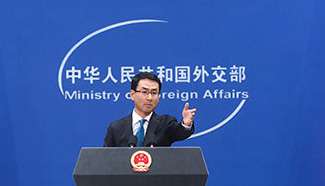UNITED NATIONS, March 7 (Xinhua) -- The anti-domestic violence law is a "landmark" legislation in China, which needs effective implementation at national and local levels, said Julia Broussard, UN Women country program manager in China.
"It provides a clear definition of domestic violence, introduces enforceable measures such as warning letters and protection orders, establishes a mandatory reporting system, and assigns specific responsibilities to governmental and civil society organizations," said Broussard in an email interview with Xinhua ahead of the International Women's Day.
China's first national law against domestic violence came into effect on March 1, 2016.
It defined domestic violence as physical, psychological and other harm inflicted by family members with beatings, restraint or forcible limits on physical liberty, recurring invectives and verbal threats listed as examples.
According to the law, victims and those in immediate danger can file for a personal protection order that the court must grant or deny within 72 hours. In urgent cases, decisions must be made within 24 hours.
Broussard said "500 protection orders have been issued by people's courts at all levels, as indicated by the courts' online database."
Broussard also noted that some aspects of the law itself and its implementation need improvements such as building clear multi-sector coordination frameworks for better effect.
"The most effective way to fight domestic violence is to prevent it," she said. "More efforts need to take place in schools, enterprises, governmental agencies and online to address negative social norms and stop domestic violence."
The International Women's Day is annually celebrated worldwide on March 8. This year, with a theme of "Women in the Changing World of Work: Planet 50-50 by 2030," the UN advocates economic empowerment for women.
Broussard said the top challenges facing Chinese women at workplace relate to gender norms and family duties.
According to her, in China, there is a gender imbalance in unpaid care work at home, with women spending on average about three times as many hours as men on unpaid work, including housework and childcare.
"The Chinese government is aware of the current challenges and is taking action on several fronts," said Broussard.
She illustrated that Shanghai will establish child care centers for children aged 2-3 in more than 20 communities in 2017.h In addition, municipal governments in various parts of China are planning to increase the days of paternity leave, she added.
To help improve the situation, joint efforts from the government, companies and civil society are needed, said Broussard, adding that UN Women will continue working with different sectors to advance gender equality in China.












